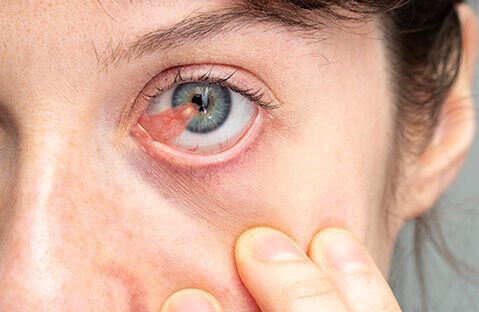
A pterygium as is a wedge-shaped, benign growth extending from the conjunctiva onto the cornea. Pterygium is most commonly found in people who live in the southern United States, especially in Texas. It is frequently found in people who spend much of their time outdoors and have excess exposure to UV light. With the prolonged exposure to UV light, conjunctival tissue thickens and slowly creeps onto the corneal surface. Dust and dryness are also believed to exacerbate pterygia, and this makes it a common problem in certain Texas climates.
Onset and symptoms of a pterygium are gradual. Many patients experience chronic inflammatory symptoms from a pterygium, including eye redness, foreign body sensations, and/or pain.
Artificial tears sometimes alleviate the symptoms of a pterygium. Topical NSAIDs and/or steroids may also be used to manage the discomfort. As a pterygium become larger and more elevated, patients typically experience more dryness, more contact lens intolerance and even a gradual loss of vision.
There is no exact known cause for the development of a pterygium, but those most at risk spend a great deal of time outdoors exposed to the sun and to environmental irritants, such as dust and wind. Farmers, fishermen, construction workers, golfers, and gardeners are among those most susceptible.
A pterygium is completely benign, but it can cause excessive eye irritation. Inflammation, dryness, tearing, redness and a foreign body sensation may all occur. A large pterygium can distort vision by causing astigmatism and in some cases, even block light from entering the eye. Patients often find pterygium to be cosmetically objectionable and are very self-conscious about their eye condition.
To fully remove a pterygium, Dr. Green performs a state-of-the-art surgical procedure using fibrin tissue adhesive “glue”. During the procedure, the patient is sedated and the eye is completely numbed. After the pterygium is removed, the eye gradually returns to normal in about two to three weeks.
The main risks of pterygium excision are infection, scarring, and recurrence. The risk of infection is very low, at less than one in 1000. At MAnn Eye, our advanced pterygium removal technique using fibrin tissue adhesive yields a very low rate.
One of the best methods for preventing a pterygium is to wear wrap around UV 400 rated sunglasses when outdoors in sunny conditions. Wearing a large hat with a large brim provides additional protection.
Even if your insurance plan doesn’t cover vision correction, you can use cash, a credit card, or approved financing for payment. Please visit our financing page for more information.
The Mann Eye Institute is a leading eye care facility with sixteen locations in Humble, West Humble, Houston, Central Austin, North Austin, Sugar Land, Katy, Spring, The Woodlands, Livingston, Bay City, Pearland, Baytown, Tomball, Sun City, and Cleveland, Texas. With various locations in the Houston and Austin areas we can provide the full continuum of care, including; designer eyewear and eye care needs, LASIK eye surgery, cataract surgery, premium lens implants and dry eye treatment options. If you are seeking expert eye doctors in Texas contact us today!
Pearland Office
10223 Broadway St., Ste. J
Pearland, TX 77584
(281) 971-9332
Spring Office
2616 FM 2920 Ste. I
Spring, TX 77388
(281) 353-8300
Tomball Office
14079 FM 2920
Tomball, TX 77377
(346) 701-4029
Katy Office
750 Westgreen Blvd.
Katy, TX 77450
(281) 392-3937
Humble - Deerbrook Office
9802 FM 1960 W, Ste. 110
Humble, Texas 77338
(281) 446-9333
Sugar Land Office
6424 E. Riverpark Dr.
Sugar Land, TX 77479
(713) 580-2525
Humble - S. Memorial Office
18850 S. Memorial Blvd.
Humble, TX 77338
(281) 446-7900
Livingston Office
1601 US-59 Loop North, Ste. 100
Livingston, Texas 77351
(936) 327-3937
Cleveland Office
429 West Southline
Cleveland, TX 77327
(281) 592-4343
Bay City Office
3612 Avenue F
Bay City, TX 77414
(979) 244-1450
Baytown Office
4750 East Freeway
Baytown, TX 77521
(281) 421-2020
South Austin Office
2600 Via Fortuna, Ste. 400
Austin, TX 78746
(512) 327-4123
North Austin Office
4314 W. Braker Lane Ste. 215
Austin, TX 78759
(512) 200-3937
Sun City Office
1530 Sun City Blvd., Ste. 150
Georgetown, TX 78633
(512) 327-3792